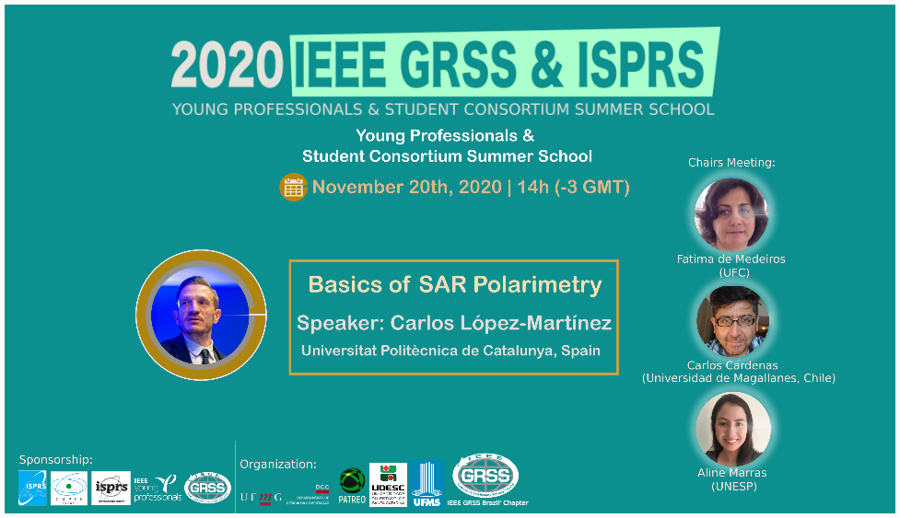Special Lecture: Basics of SAR Polarimetry
Summary. Nowadays, many spaceborne Synthetic Aperture Radar (SAR) systems acquire polarimetric data. These range from systems presenting fully polarimetric acquisition modes, as for instance TerraSAR-X (X-Band), RADARSAT-2 (C-Band), ALOS-2 (L-band), SAOCOM (L-band) or the future missions BIOMASS (P-band) or NISAR (L&Sbands), to systems presenting dual or compact polarimetric modes, as for example Sentinel-1a&b (C-band dual polarimetric) or RCM (C-band). With respect to single-channel SAR data, Polarimetric SAR (PolSAR) data allows an improved characterization of the targets being observed, especially in terms of their geometry and their water content, hence offering a better physical description. The objective of this presentation is to introduce, in a didactic and enjoyable way, the concept of polarization and the basics of PolSAR, how to interpret the physical information contained in PolSAR data, the particularities of dual or compact PolSAR data compared to fully polarimetric data and the main applications, all of them with examples based on real PolSAR data from the main spaceborne systems.
About the Speaker
Dr. Carlos Lopez-Martinez (S’97-M’04-SM’11) received the MSc. degree in electrical engineering and the Ph.D. degree from the Universitat Politècnica de Catalunya, Barcelona, Spain, in 1999 and 2003, respectively. Dr. Lopez-Martinez is an Associate Professor in the area of remote sensing and microwave technology in the Universitat Politècnica de Catalunya, Barcelona, Spain. He has a large professional international experience at DLR (Germany), at the University of Rennes 1 (France), and as a group leader of the Remote Sensing and Natural Resources Modelling team in the Luxembourg Institute of Science and Technology (Luxembourg). His research interests include Synthetic Aperture Radar (SAR) theory, statistics and applications, multidimensional SAR, radar polarimetry, physical parameter inversion, advanced digital signal processing, estimation theory, and harmonic analysis. Dr. López-Martínez has authored more than 200 articles in journals, books, and conference proceedings, and received the EUSAR 2002 Conference Student Prize Paper Award, co-authored the paper awarded with the EUSAR 2012 Conference First Place Student Paper Award, and received the IEEE-GRSS 2013 GOLD Early Career Award. Dr. López-Martínez has broad academic teaching experience from bachelor, master, and Ph.D. levels to advanced technical tutorials presented at international conferences and space and research institutions worldwide. He is an associate editor of the IEEE-JSTARS journal and the MDPI Remote Sensing, acting also as invited guest editor for several special issues. He has collaborated in the Spanish PAZ and the ESA’s SAOCOM-CS missions, in the proposal of the Parsifal mission and he is a member of the ESA’s Sentinel ROSE-L Mission Advisory Group. He was appointed vice-president of the IEEE-GRSS Spanish chapter, and in 2016 he became its secretary and treasurer. From 2011 Dr. López-Martínez collaborates with the IEEE-GRSS Globalization initiative in Latin America, contributing to the creation of the IEEE-GRSS Chilean chapter and the organization of the 2020 LAGIRSS conference, being appointed as Latin America liaison in 2019. He is also co-chair of the Tutorial Technical Committee of the Indian 2020 InGARSS conference.


